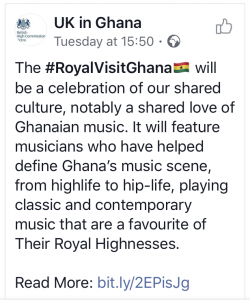Last week British successor to the throne, Prince Charles and the Duchess of Cornwall, more popularly known as Camilla, came to Ghana for a four-day visit. The tour was part of a 9 day West Africa visit with stops in not just Ghana, but the Gambia and Nigeria as well.
Britain was heavily involved in the transatlantic slave trade which greatly affected and weakened what is now Ghana, subsequently tightened its grasp through bloody wars with the local kings and leaders, especially the Ashanti kingdom. In 1874, the protectorate of Gold Coast was proclaimed and until 1957 when Ghanaian freedom fighters negotiated independence, the British flag flew over this land and Gold Coast people were killed, exploited, and without basic rights. Hence, a state visit from the former colonizer with such a power imbalance infused history is symbolically important and interesting to study – and discuss, see info on an event below!
With this background, I was shocked and outraged when I saw the UK in Ghana facebook account discussed the visit with the words “celebration of a shared culture” – how is this bloody past equal to “a shared love of Ghanaian music”? Since when?

But was later informed of the major billboards around town which had President Akuffo Addo and Prince Charles on them along with the text “Shared History, Shared Future”, a message that both omits and distorts reality and hence insults the intelligence of Ghanaians. What is shared about being exploited? What is shared from one entity exporting its language, education system, religion at the expense of the other? What is shared if one nation colonized the other?

A Facebook friend also pointed out that the shared future, propped up by an acute need for trading partners for the UK ahead of the automatic (Br)exit from the EU next year…
And there were other things:
- Waving kids waiting in the sun and missing school
- Ghana’s highest order medal to Prince Charles
- A park was named after Prince Charles in Kumasi
As Ghanaian artist Fuse ODG complained in this video and Satirist Machiavelli drew something only Ghanaians can understand…
Now, this is not just Britain’s doing. Ghana has to think harder in how it positions itself when power visits. Look at the Benin traditional leader asking Prince Charles to return stolen goods, for instance. Or is there a gain to Ghana (or the Ghanaian elite?) for playing along I do not understand?
Come discuss tonight Saturday 10 Nov at Libreria at 6.30pm!



